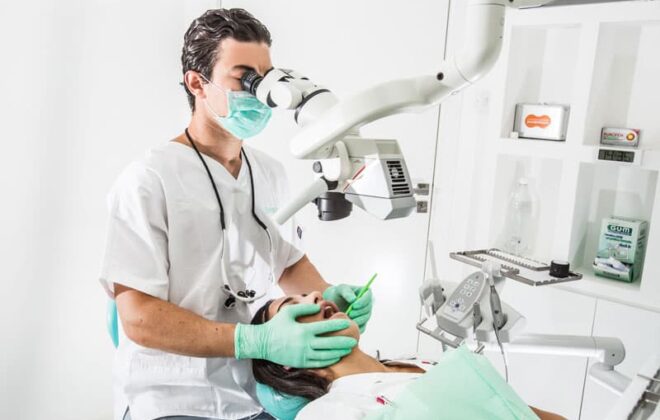Why Root Canal Procedures Do Not Cause Cancer
Online articles, a film, and even some doctors claim that root canal procedures are the underlying cause of cancer and other diseases. This is false.
Root canal procedures do not cause cancer. This myth derives from unfounded claims that 97% of people who have terminal cancer had root canal surgery, suggesting a link between dental work and the development of cancer.
With the American Association of Endodontists (AAE) stating that over 15 million root canal treatments are carried out every year in the US, this claim can seem alarming. However, there is no scientific evidence to suggest it is true.
In this article, learn more about the myth, facts, and more.
Do root canal procedures cause cancer?
Root canal treatments do not cause cancer. They are a generally safe and common dental procedure with no links to the development of cancer anywhere in the body.
Not only is there no evidence to support the claims of causality between root canals and cancer, a 2013 study actually suggested the opposite.
Researchers found that people who had had root canal treatments were less likely to have head and neck cancer.
Where does this idea come from?
There has been a recent resurgence in the belief in a link between root canal treatments and cancer that stems from a short-lived documentary that aired in early 2019.
The film ‘Root Cause’ boasts that it exposes ‘one of the world’s greatest medical industry cover-ups,’ and cites doctors who claim that root canals lead to body-wide health issues.
Streaming websites, such as Netflix, took the film down after an uproar from the dental and medical community.
The idea that root canals cause cancer is much older than this documentary, however.
It began almost a century ago, when science did not have as many control measures as it does today, and when scientists knew less about the human body.
The AAE outline how this myth began. They explain that in the early 1900s, a doctor called Weston A. Price suggested that dental restorations, such as root canals, were the cause of other body-wide conditions.
Price studied people who had undergone root canal treatments and had other health conditions. He removed their affected teeth and implanted them into rabbits. Allegedly, the rabbits developed the same health conditions as the people whose teeth Price had removed. This led to his focal infection theory.
Price also asserted that he found pathways through which bacteria can travel to every part of the body from the teeth.
Scientists have debunked his theory many times, and there is no evidence to suggest that bacteria cause cancer.
Modern followers
Dr. Joseph Mercola, who is a doctor and online personality, believes this 100-year-old research is accurate and relevant today.
He claims that Price’s work has been ‘suppressed by medical and dental professionals.’
Mercola bases his claims, in part, on a researcher called Dr. Robert Jones, who apparently found a high correlation between root canals and breast cancer. Except, the research Mercola cites does not exist.
There is no available study on the links between breast cancer and root canals by this author. Nor are there any other studies that show any like, causal, or correlational links between them.
Causation, also known as cause and effect, is when one thing causes a second event or action. For example, scientists now know that smoking causes cancer.
Correlation is not the same and can be a coincidence. For example, a person could find that lots of people who have tattoos also have piercings. Neither one causes the other, however.
Root canal treatment is a procedure dentists use to treat infection at the center of a tooth.
The part of the tooth known as the root canal contains the pulp of the tooth. When bacteria get into this area, an infection can develop, which may eventually lead to cell death in the pulp.
Infections in the pulp can cause a variety of symptoms, including pain when chewing, pain when eating hot or cold food or drink, and loose teeth.
While the initial symptoms may pass, it could be because the infection has spread further. Additional symptoms may occur if this happens, such as:
- the return of pain when biting or chewing
- swollen gums near the affected tooth
- pus oozing from the area
- visible swelling on the face
Root canal treatment is a procedure that effectively cleans out the dead and dying pulp from the infected tooth. The dentist will remove the bacteria and then seal the tooth.
They will fit a crown on the tooth to prevent future problems from occurring. This procedure leaves the original tooth in place to help maintain the integrity of the jaw.
The only alternative treatment for this kind of infection is extracting the tooth.
Removing the tooth is more traumatic to the mouth than a root canal, and most dentists agree that it is best to keep as many natural teeth in the mouth as possible.
Are tooth extractions better?
Root canal treatment often occurs over two or more appointments, whereas a dentist can pull a tooth in one visit.
A simpler or quicker procedure does not always mean better. It is often beneficial to have the original teeth in a jaw, as this helps maintain the structure of the jaw.
As individual factors play a role, people can ask their dentist about whether it is best to extract the tooth or have a root canal procedure.
Summary
Some people who have cancer may have had a root canal treatment at some point in their life. This does not mean that the root canal procedures had anything to do with the development of cancer.
With modern developments in the field of dental work, these treatments are safer and more accessible. If a dentist can save the tooth by performing a root canal procedure instead of pulling a tooth, they will likely recommend this.
The myth about root canal procedures may be prevalent on the internet, but there is no scientific evidence to back up these claims.
Article originally appeared at: https://www.medicalnewstoday.com/
Author: Medical News Today



